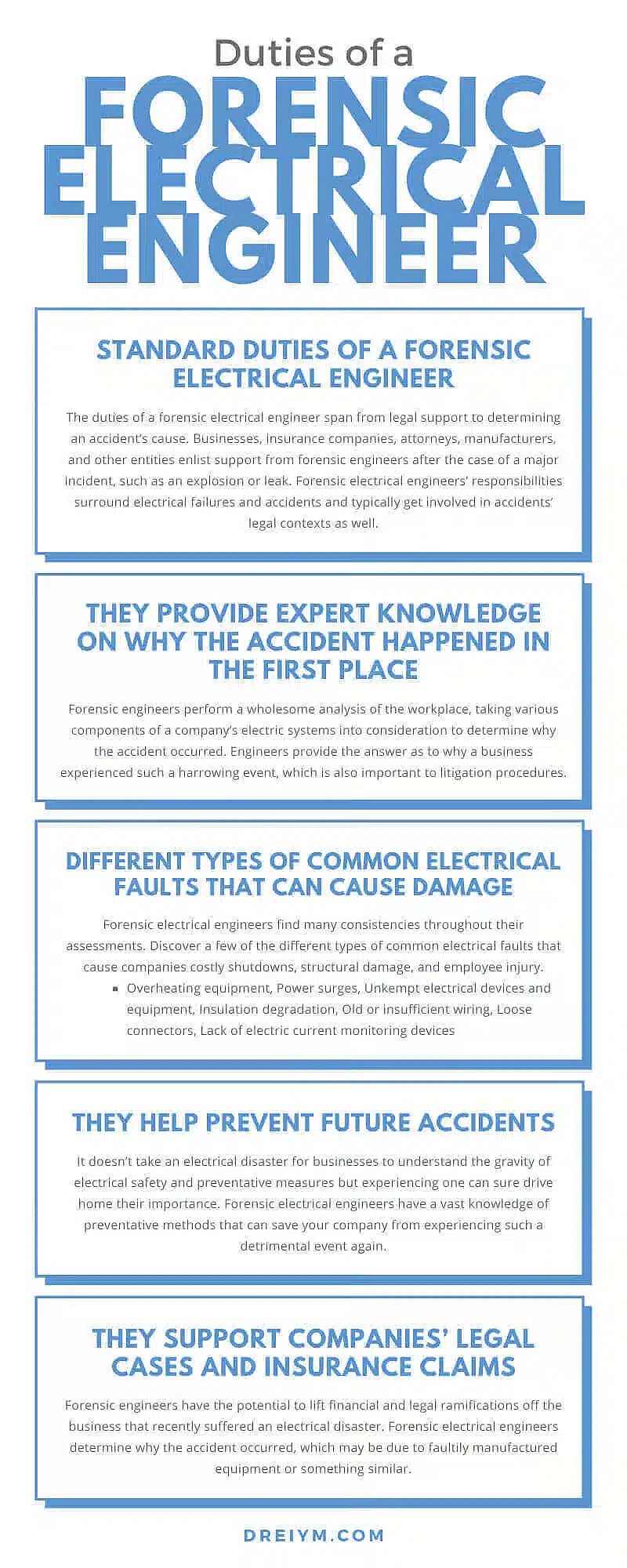Duties of a Forensic Electrical Engineer
Forensic services inspect companies’ structural and electrical systems after major incidents that led to company infrastructure damage or employee injury. Investigation toward severe, costly damages helps businesses locate the source of their accident and informs them on ways to keep similar occurrences from happening in the future.
Forensic electrical engineering specifically deals with the failure of electrical systems that have caused injury, damage to infrastructure, or, commonly, an electrical fire. When forensic electrical engineering consultants locate the cause of an electrical disaster, they can help shift the liability and financial repercussions off of a suffering business. Dreiym Engineering explores the duties of a forensic electrical engineer to emphasize the importance of hiring one after an electrical calamity.
Standard Duties of a Forensic Electrical Engineer
The duties of a forensic electrical engineer span from legal support to determining an accident’s cause. Businesses, insurance companies, attorneys, manufacturers, and other entities enlist support from forensic engineers after the case of a major incident, such as an explosion or leak. Forensic electrical engineers’ responsibilities surround electrical failures and accidents and typically get involved in accidents’ legal contexts as well, which we’ll discuss below.
They Provide Expert Knowledge on Why the Accident Happened in the First Place
Forensic engineers perform a wholesome analysis of the workplace, taking various components of a company’s electric systems into consideration to determine why the accident occurred. Engineers provide the answer as to why a business experienced such a harrowing event, which is also important to litigation procedures.
Different Types of Common Electrical Faults That Can Cause Damage
Forensic electrical engineers find many consistencies throughout their assessments. Discover a few of the different types of common electrical faults that cause companies costly shutdowns, structural damage, and employee injury.
- Overheating equipment
- Power surges
- Unkempt electrical devices and equipment
- Insulation degradation
- Old or insufficient wiring
- Loose connectors
- Lack of electric current monitoring devices
They Help Prevent Future Accidents
It doesn’t take an electrical disaster for businesses to understand the gravity of electrical safety and preventative measures but experiencing one can sure drive home their importance. Forensic electrical engineers have a vast knowledge of preventative methods that can save your company from experiencing such a detrimental event again.
For example, Dreiym Engineering offers ground tests, Arc Flash studies, and electrical design consultation to maximize electrical safety in the workplace. Our analyses prevent abnormal or excessive electrical currents which cause intense fires and put both your staff and infrastructure at risk.
They Support Companies’ Legal Cases and Insurance Claims
Forensic engineers have the potential to lift financial and legal ramifications off the business that recently suffered an electrical disaster. Forensic electrical engineers determine why the accident occurred, which may be due to faultily manufactured equipment or something similar.
Determining the liability in a case significantly supports businesses in their insurance claims. Often, companies don’t have immediate access to the financial means necessary to repair the immense damage from a drastic electrical fire. Forensic electrical services work with insurance companies to confirm the root of the cause, which in turn allows businesses to acquire the insurance support they need ASAP.
Other Types of Forensic Engineering
Company accidents occur for a wide variety of reasons, which aren’t always related to their electric systems. Because severe incidents and damage can happen from a range of sources, forensic electrical engineering isn’t the only type of forensic service that businesses need. We’ve listed a few other branches of forensic engineering that are just as important as forensic electrical engineering when it comes to maximizing workplace safety and structural efficiency.
- Forensic fire engineering
- Forensic materials engineering
- Forensic polymer engineering
- Structural forensic engineering
- Industrial fire forensic engineering
Different Skills Every Forensic Electrical Engineer Needs
Before they can join the forensic field, forensic electrical engineers must acquire the proper education, licensure, and certification. Dreiym Engineering also notes various essential skills that help forensic electrical consultants succeed at what they do.
Education Requirements
Most forensic engineers have a four-year engineering degree under their belt. Different majors that are popular amongst aspiring specialty forensic engineers include electrical engineering, civil engineering, mechanical engineering, computer engineering, and more.
State Licensure
Forensic electrical engineers must become licensed engineers in the state of their employment before becoming forensic engineers. Each state has a specific set of requirements for engineer licensure, which typically include taking a rigorous engineering exam.
Certification
To achieve certification in forensic engineering, an engineer will partake in a year-long process to showcase their forensic expertise. The certification process requires engineers to display their forensic expertise through engineering, technical knowledge, ethics, and oral and written exams.
Essential Skills
The following set of skills support forensic teams throughout their daily duties.
- Detail-oriented: No matter how small the details, forensic electrical engineers must take them all into consideration. One minor detail can make all the difference in determining the cause of an incident.
- Solid communication: It’s common for forensic engineers to work in pairs or teams when assessing a company’s grounds. Engineers must be able to clearly discuss their findings with their team members as well as the company that hired them. They also commonly interact with insurance companies, which they must be able to adequately relay information to.
- Scientific reasoning: Forensic engineers apply a wealth of scientific methods to their reasoning when fleshing out investigations. Engineers need a strong foundation of scientific understanding to accurately investigate electrical explosions.
- Investigative direction: A successful forensic electrical engineer doesn’t jump to conclusions. They use their deductive reasoning and investigative abilities to evaluate the entire situation and eventually locate the cause.
- Compassion: Companies will naturally veer toward forensic electrical engineering companies that show compassion. Structural damages may be drastic and sometimes fatal, leaving businesses feeling doubtful about their future. Forensic engineers provide scientific support, of course, but businesses always appreciate when engineers add a personalized, empathetic touch, too.
For All Your Forensic Electrical Engineering Projects
Dreiym Engineering offers thorough forensic electrical assessments for companies that have recently suffered severe electrical damage. In addition to our forensic investigative services, we offer electrical and corrosion consulting services. Our team of dedicated engineers provides quality and comprehensive analyses to get to the bottom of infrastructure damage and promote the safest environment possible for your company. Contact us today to learn more about our investigation procedures and how we may offer expert witness testimony for your business.













































